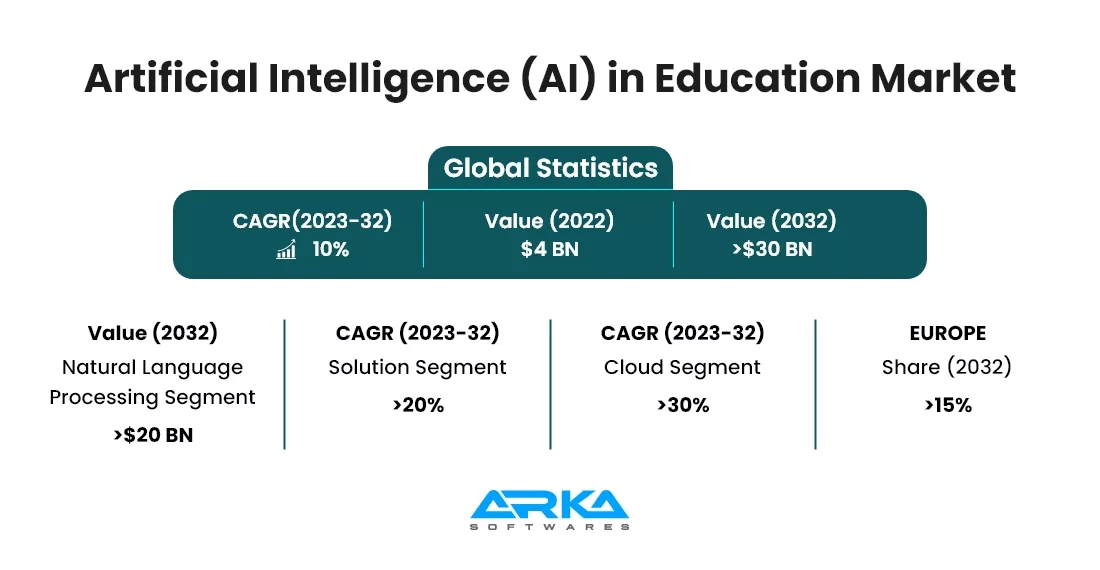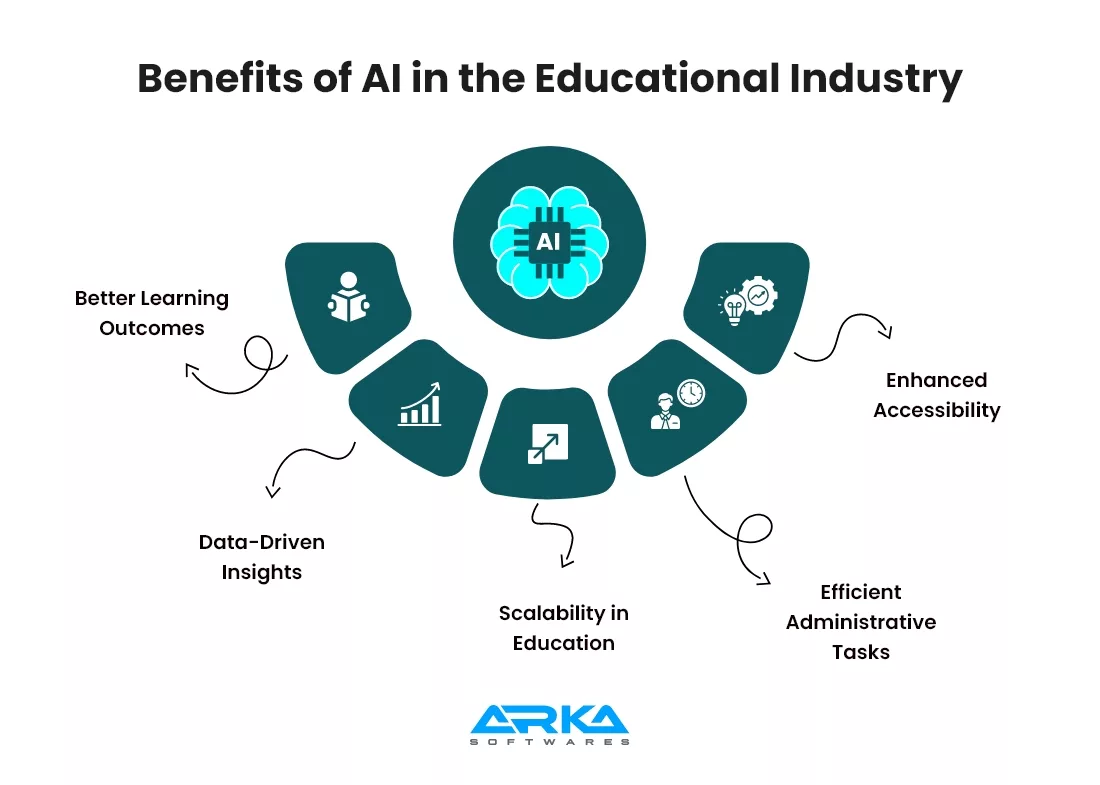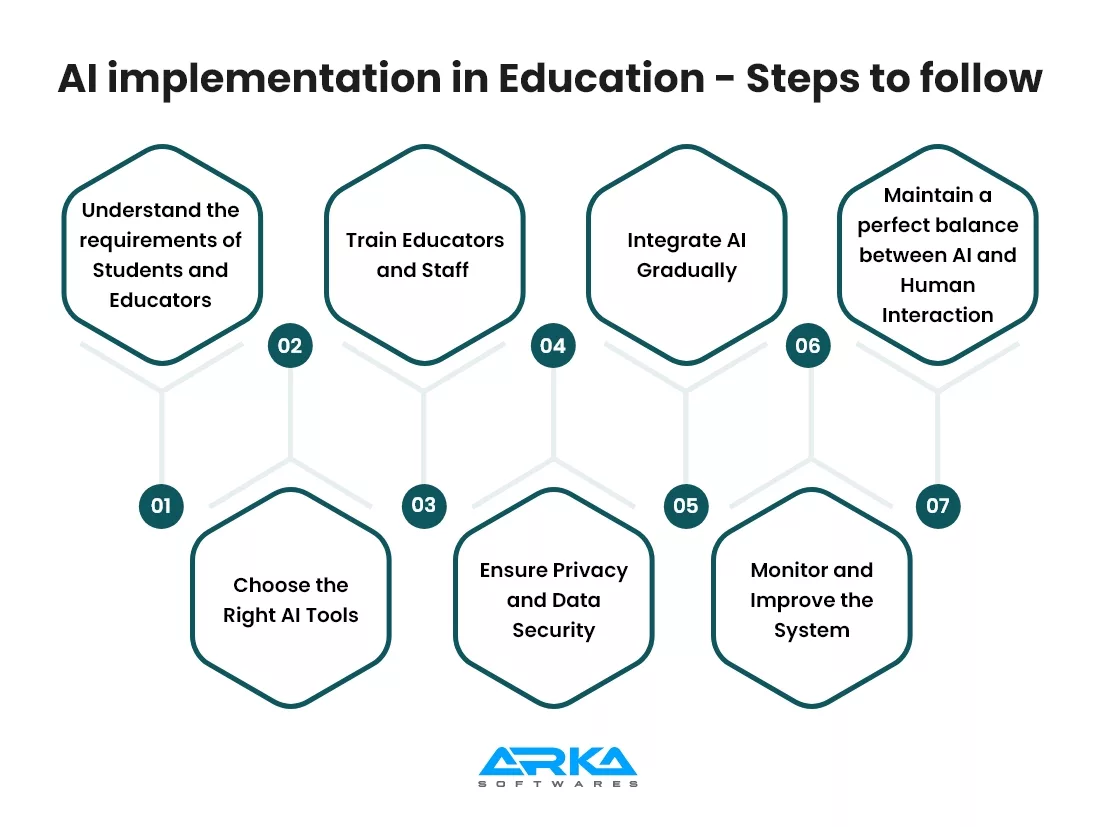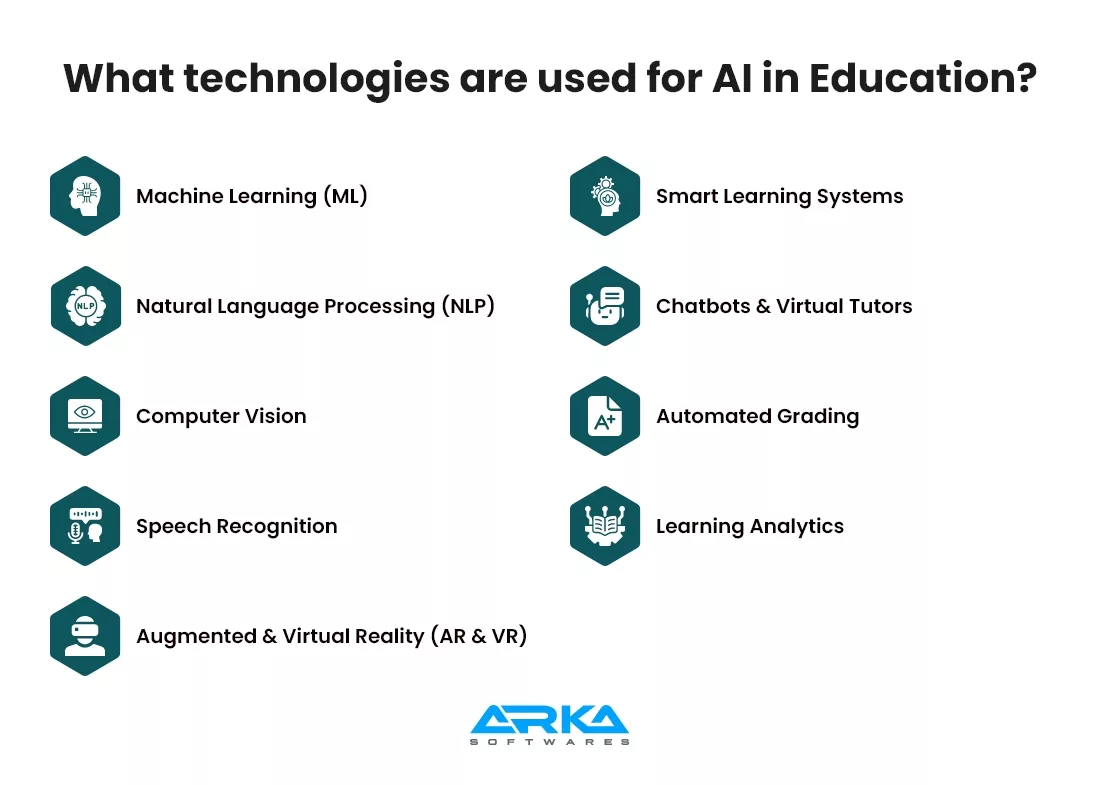We are living in a fast-paced Technology era, where emerging technologies are transforming every walk of life. Education is indeed not an exception. We are witnessing a massive transition in this industry and can see how technology has been used to make learning more interactive and accessible.
Schools and EdTech companies are using AI to personalize lessons, identify learning gaps, and provide instant feedback through online platforms to enhance the overall learning experience.
AI isn’t just about automation—it’s about developing smarter learning experiences. Virtual tutors and chatbots help learners by answering their complex queries and assisting them in acquiring knowledge at their own pace.
The AI-aided tools make learning more engaging and help students grasp concepts better.
While AI can’t replace real teachers, it’s helping create classrooms that support students in modern ways.
AI is transforming education, making learning more personalized, efficient, and accessible. Here are some key facts and statistics about Artificial Intelligence in education:

Here are some top use cases of AI in the Education industry:
Instead of sifting through endless books and notes, students can now get personalized study materials that highlight key points. It’s like having a personal tutor who organizes required information in an easy-to-understand format, making learning less overwhelming and more effective.
Schools have tons of paperwork and different administrative functions, from scheduling classes to keeping track of student progress. Automating these routine tasks helps educators and staff focus more on students and less on administrative tasks.
Imagine having a virtual tutor available 24/7 to answer all of your questions and explain complex concepts in fly. Virtual learning assistants guide students through lessons, helping them improve at their own pace without waiting for a teacher’s availability.
Creating the customized and correct learning plans for students isn’t an easy task. It is extremely crucial to analyze student’s performance and emerging learning trends in the market.
AI assists the educators in creating personalized curriculums that fit different needs, helping schools keep up with dynamic education styles.
Education should be accessible and safe for everyone, no matter where they are. Today, we have a plethora of AI-aided systems, which store student records in a decentralized way, making them more secure while still keeping them accessible whenever needed.
Technology helps with everything from organizing exams to an easy grader for scoring tests. Some systems even monitor students remotely to prevent cheating, ensuring that exams are fair while making grading more efficient and accurate.
Learning a new language takes a lot of effort and practice. The AI interactive tools can make this tedious process easier.
Instead of just memorizing words, students can engage in real conversations, helping them get better at speaking and understanding a new language naturally.
Not every student learns the same way, and flexible learning allows them to study at their own pace. Some AI tools can customize the learning session based on their preference and performance, ensuring they get the right support exactly when they need it.

The use of AI in the Education industry is still evolving, and the following benefits make AI the best bet for educators and learners.
Every student learns differently. Some need extra time, while others grasp concepts quickly. AI helps tailor lessons to individual needs, ensuring students learn at their own pace without feeling left behind.
Teachers spend a lot of time grading papers, organizing schedules, and handling administrative work. AI takes care of these routine tasks, so teachers can focus more on teaching and supporting students.
Students often have questions outside of school hours. AI-powered tutoring systems and chatbots provide quick answers.
Learning doesn’t have to be just textbooks and lectures. AI brings subjects to life with interactive tools, virtual reality, and engaging simulations that make lessons more enjoyable and memorable.
AI helps students with disabilities by offering speech-to-text services, translating languages, and adapting learning materials to their needs. This makes education more inclusive for everyone.
Schools and universities can analyze student performance and feedback to improve lesson plans, teaching strategies, and curriculum designs, ensuring students get the best possible education.
Some students prefer to study on their own time. AI allows them to access lessons anytime, practice their skills, and review concepts without needing a strict schedule. It helps them build confidence in their learning.
Technology is shaping the world, and learning to use AI helps students develop skills they’ll need for future careers. Understanding AI and how it works gives them a head start in industries that rely on technological advancements.

AI is making learning smarter and more engaging. Here are some Real-World platforms using AI to transform the education industry:
This language-learning app uses Artificial Intelligence to personalize lessons based on a student’s progress and preferences. The cheerful green owl mascot keeps learners motivated with daily exercises, adaptive challenges, and a reward system that makes language learning feel like a fun game.
A tutoring assistant powered by AI, Khanmigo helps students with subjects like math and reading while also supporting educators in curriculum planning.
Parents can also use this tool to monitor their child’s learning and even understand topics themselves, so they can help with homework.
This tool uses AI to transcribe speech into text with high accuracy. It helps educators in creating lesson plans faster. It also assists students, especially those with disabilities—by enabling voice navigation and improving spelling skills.
This AI tool is primarily focused on STEM subjects. StepWise offers interactive lessons, adaptive quizzes, and personalized feedback, which help students grasp complex concepts with ease.
This AI-powered educational platform offers personalized learning experiences by adapting to a student’s preferences and progress. It helps educators track student performance, improving lesson planning and engagement.
Each of these platforms makes education more accessible and effective, helping students and educators alike.

Implementing AI in the education industry requires a well-thought-out approach to ensure it benefits both students and educators.
Here’s how schools and institutions can introduce AI effectively:
Before bringing in AI tools, it’s important to identify the challenges faced by students and teachers. Whether it’s improving personalized learning, reducing administrative work, or enhancing engagement, knowing what needs improvement will help make better choices.
There are many AI-powered educational tools available, from virtual tutors to automated grading systems. Schools should select solutions that align with their objectives, budgets and learning methodologies.
Educators need to understand how AI works to use it effectively. Providing training sessions can help teachers feel confident using AI tools in their lessons rather than seeing them as complicated technology.
Since AI collects student data to personalize learning, schools must prioritize privacy and security. Having strong policies in place will protect sensitive information while ensuring responsible and ethical AI usage.
Instead of implementing AI in haphazard way, AI should be introduced step by step. Schools can start with simple AI features like automated grading or virtual tutors before expanding to more advanced applications and modules.
Once AI is in use, educators and administrators should regularly assess its impact and provide the necessary feedback for corrective actions. Gathering feedback from teachers and students helps make improvements and ensures AI continues to support learning in the best possible way.
While AI can assist with learning, it should never replace teachers or human connection. A balanced approach ensures that students receive both technological benefits and meaningful interactions with educators.
By implementing AI thoughtfully and strategically, educational institutions can transform the education without losing the essential human touch that makes learning meaningful.

AI is transforming education in many ways, making learning more accessible, personalized, and engaging. Here are some key technologies behind it:
These technologies are reshaping classrooms, helping teachers and students work smarter, not harder.

AI is bringing exciting changes to education, but it also comes with challenges and risks that need careful attention.
Here are some of the biggest challenges and concerns:
Schools collect a lot of student data, and AI systems rely on this information to personalize learning. However, there’s a risk that sensitive data could be misused, leaked, or hacked, raising serious privacy concerns.
Not all schools can afford AI-powered tools. The cost of software, hardware, and training can be high, making it difficult for smaller institutions or schools in low-income areas to access these benefits.
AI can assist students and teachers, but it shouldn’t replace traditional learning methods. Too much dependence on AI may weaken students’ critical thinking, problem-solving, and interpersonal skills.
AI systems are trained on existing data, which may contain biases. If not carefully managed, AI could unintentionally favor certain groups, making education unfair or reinforcing inequalities.
Education is more than just absorbing information—it involves discussions, mentorship, and emotional support. AI tools can help with facts and quizzes, but they lack the human connection that teachers provide.
Deciding how AI should be used in classrooms is complicated. If schools rely too much on automated grading or tutoring systems, it could raise ethical questions about fairness, accountability, and student rights.
Many educators and institutions are used to traditional teaching methods. Adapting to AI requires training and a shift in mindset, which can be challenging for those unfamiliar with technology.
AI has great potential in education, but it’s important to use it wisely while keeping these risks in mind. Striking a balance between innovation and human-centered learning is the key to making AI a helpful tool rather than a disruption.
Education is evolving, and AI is making it more personalized, accessible, and efficient. Arka Softwares specializes in developing and integrating cutting-edge AI-powered solutions into schools, universities, and learning platforms, ensuring seamless adoption.
We provide smart tutoring systems, automated grading tools, personalized learning platforms, and AI-driven analytics to help educators, enhance student engagement and optimize learning methodologies.
Whether you’re looking to create interactive learning experiences or improve your existing administrative tasks and workflows, our seasoned AI Experts can design bespoke AI solutions to fit your dynamic needs and vision.
Let’s work together to build a smarter, more effective education system
AI has been transforming the Education Industry like never before. It is enabling the students to learn at their own pace, assisting educators with their daily tasks, and making learning more interactive. While technology is powerful and objective-oriented, it works best when coupled with the human connection.
Education isn’t just about automation; it’s about mentorship, creativity, and real-world experiences that shape students’ growth.
The key here is Balance. AI can transform the classrooms, but educators are and will always be at the heart of learning. As the AI technology continues to evolve, schools and learning institutions must use AI thoughtfully and carefully, ensuring it enhances education without replacing the personal touch that makes learning truly meaningful.
AI helps students learn at their own pace, complete assignments quickly, creates study materials, and even uses Chatbots to answer typical questions.
AI makes learning more fun and engaging, saves teachers time, supports students with disabilities, and provides instant help whenever needed.
Some concerns include privacy issues, the high cost of AI tools, possible biases in AI systems, and the risk of students relying too much on technology instead of thinking critically.
No! AI is indeed a revolutionary technology, but teaching requires human connection, engagement, creativity, and guidance—things Artificial Intelligence simply can’t provide.